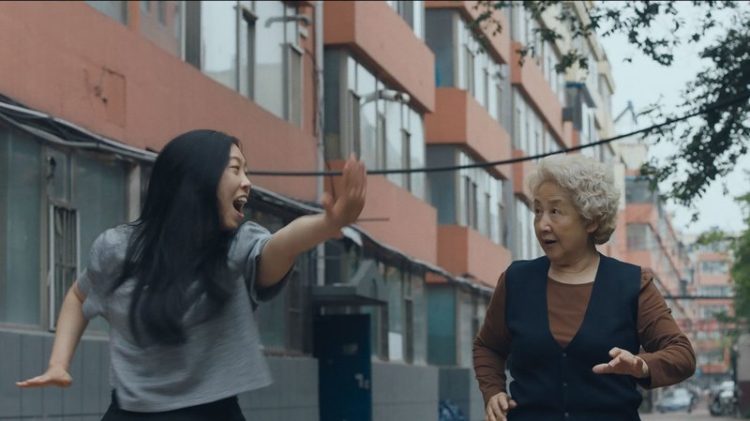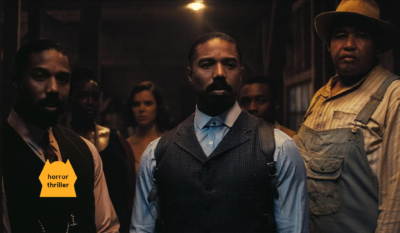The Farewell follows a New Yorker as she travels to China to say goodbye to her sick grandmother — who doesn't know she's dying.
30-second review: The Farewell is a movie of dichotomies — Chinese culture and American culture, parents and children, mourning and celebrating, youth and old age — that appropriately straddles the line between drama and comedy. Even during dramatic moments, it seems that there's always something lighter going on in the background to remind us that everything in the movie is based in love.
It's so difficult to make the exploration of emotions and family strife entertaining, but director Lulu Wang was able to pull it off by avoiding the melodramatics and instead focusing on the characters, their experiences, and their relationships to each other. It also helps that her Awkwafina is an incredible lead with enough charm to pull you in and the dramatic chops to keep you invested.
Where to watch The Farewell: Now playing in theaters.
Full review below ?

One night when I was 14 or 15, my dad — who immigrated to the United States in the 80s from the Philippines — walked into my room, sat down on my bed and started to cry. I never saw my dad cry, not even when both of my grandparents died. It was out of nowhere. And he started talking about how he felt like he was a bad son because he didn't take care of his parents enough or let them live in our house as they got older. “We have so much space, they could have just stayed here,” he said.
I later learned that despite the pleading of most of my aunts and uncles, my grandparents never wanted to move in with any of them, afraid they'd be a burden.
That's one of the many conundrums of Asian and Asian-American culture that Lulu Wang‘s film The Farewell explores. The fact that showing your emotions is like burdening other people with it. The worst thing that you can do is worry others. It leads to a lot of emotional repression.
We learn as we grow up that Eastern and Western cultures are like night and day. So for first-generation Americans like myself or people who immigrated to America as a child like the movie's protagonist Billie (Awkwafina), the clash is hard to navigate. And she's thrown into a situation where she needs to face it head on.
A New Yorker to the bone, Billie steadfastly pursues her dreams while watching her bank account suffer as a result. However, when she finds out from her parents — after a lot of prying — that her grandmother who she calls “Nai Nai” (Zhao Shuzhen) has stage four lung cancer she doesn't hesitate to fly back to her hometown in China, which she left at the age of six with her parents.

The complication is that her entire family including her dad (Tzi Ma), mom (Diana Lin), and uncle Haibin (Jiang Yongbo) have hidden Nai Nai's true diagnosis from her and instead are visiting under the guise of a wedding for her grandson Hao Hao (Chen Han). In reality, they're there to say goodbye to her and be with her one last time.
This leads to plenty of disagreements between Billie and her family based on the differences in cultures, which is explored in more ways than one. However, it also sets the stage for plenty of hilarity as a very real wedding is being put on by Nai Nai even though Hao Hao and his girlfriend Aiko (Aoi Mizuhara) have only been together for three months.
Even when serious discussions are happening, it always seems like there's some lightness in the background to remind us that despite the deception it's all being done out of love. It's both hilarious and heartbreaking. Awkwafina has proven with roles in Crazy Rich Asians and Ocean's Eight that she can do the former, The Farewell proves she can also be an emotional powerhouse.
The movie is made up of these moments where the characters are litigating their decision to not tell Nai Nai the truth. In one scene, Haibin tells Billie that they have to do it so they can bear the emotional burden for her. It makes it all the more tragic because Nai Nai is so full of life and Zhao Shuzhen — who is fully deserving of an Oscar nomination — gives her the richness and sass the character deserves.
There's a scene when Billie's mother asks Little Nai Nai (Lu Hong), Nai Nai's younger sister, whether she'll be okay when Nai Nai passes away. She gives a hopeful answer mentioning she wants to travel and maybe visit them in America. She then turns towards her and tells her not to worry about her.
All any of us want to do — Asian, Asian-American, and otherwise — is to not burden our loved ones with our own problems. That's the main crux of all the moments that make up The Farewell. It's all just character's trying to find ways to make life easier on each other whether it's sending their kid to America for college or giving their granddaughter money to spend on something special or lying to a grandmother about their health.
But what Wang brilliantly explores is the consequences of those actions. That kid could never come back or forget their home, the granddaughter would be no better off than they were before, the grandmother could die without properly saying goodbye. She litigates all those decisions without coming down on either side. Instead, she's on the side of the characters and what they need to go on. Most of them don't know what that is. But then again, do any of us?
ADVERTISEMENT
More movies, less problems
- Jordan Peele Unleashes the First Trailer for ‘HIM'
- ‘Sinners' is the best movie of the year | movie review
- Romantic sci-fi thriller ‘The Gorge' hits its mark | movie reivew
Hey! I'm Karl. You can find me on Twitter and Letterboxd. I'm also a Tomatometer-approved critic.
💌 Sign up for our weekly email newsletter with movie recommendations available to stream.
ADVERTISEMENT
Hey, I'm Karl, founder and film critic at Smash Cut. I started Smash Cut in 2014 to share my love of movies and give a perspective I haven't yet seen represented. I'm also an editor at The New York Times, a Rotten Tomatoes-approved critic, and a member of the Online Film Critics Society.


Comments are closed.